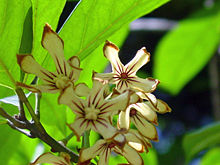Cola acuminata: Difference between revisions
switch taxobox to speciesbox |
Tom.Reding (talk | contribs) m Add from=Q522881 to {{Taxonbar}}; WP:GenFixes on, using AWB |
||
| Line 1: | Line 1: | ||
{{ |
{{More citations needed|date=January 2017}} |
||
{{speciesbox |
{{speciesbox |
||
|image = Cola acuminata-masc-fem.jpg |
|image = Cola acuminata-masc-fem.jpg |
||
| Line 25: | Line 25: | ||
{{Reflist}} |
{{Reflist}} |
||
{{Taxonbar}} |
{{Taxonbar|from=Q522881}} |
||
[[Category:Cola (plant)|acuminata]] |
[[Category:Cola (plant)|acuminata]] |
||
| Line 31: | Line 31: | ||
[[Category:Flora of West Tropical Africa]] |
[[Category:Flora of West Tropical Africa]] |
||
[[Category:Flora of the Democratic Republic of the Congo]] |
[[Category:Flora of the Democratic Republic of the Congo]] |
||
{{Malvales-stub}} |
{{Malvales-stub}} |
||
Revision as of 04:56, 1 February 2018
This article needs additional citations for verification. (January 2017) |
| Cola acuminata | |
|---|---|

| |
| Scientific classification | |
| Kingdom: | Plantae |
| Clade: | Tracheophytes |
| Clade: | Angiosperms |
| Clade: | Eudicots |
| Clade: | Rosids |
| Order: | Malvales |
| Family: | Malvaceae |
| Genus: | Cola |
| Species: | C. acuminata
|
| Binomial name | |
| Cola acuminata | |
| Synonyms | |
|
Sterculia acuminata | |
Cola acuminata is a species in the genus Cola, of the family Malvaceae, native to tropical Africa.
Fruits
The fruits are rough, mottled and up to 8 inches long and contain large, flat and bright red coloured seeds, commonly known as Kola nuts.
Uses
Its fruits are harvested from the forests of the Democratic Republic of Congo.
The fruits contain about 2% catechine-caffeine (colanine), which is believed to have a greater level of alkaloids (caffeine), thereby increasing the stimulatory effect. They are roasted, pounded or chewed and can also be added to drinks such as tea or milk or cereal such as porridge.
In West Africa this product is sold as a treatment for erectile dysfunction,[1] although evidence for its effectiveness is limited.

References
- ^ Maud Kamatenesi-Mugisha and Hannington Oryem-Origa (Mar 2005). "Traditional herbal remedies used in the management of sexual impotence and erectile dysfunction in western Uganda". Afr Health Sci. 5 (1): 40–49. PMC 1831906.
